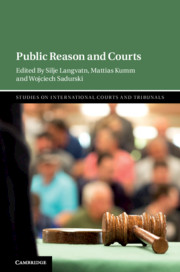Book contents
- Public Reason and Courts
- Studies on International Courts and Tribunals
- Public Reason and Courts
- Copyright page
- Contents
- Contributors
- Preface
- Acknowledgments
- 1 Taking Public Reason to Court: Understanding References to Public Reason in Discussions about Courts and Adjudication
- Part I Public Reason in Constitutional Courts
- 2 Must Laws Be Motivated by Public Reason?
- 3 The Importance of Constitutional Public Reason
- 4 The Question of Constitutional Fidelity: Rawls on the Reason of Constitutional Courts
- 5 The Challenges of Islamic Law Adjudication in Public Reason
- 6 “We Hold These Truths to Be Self-Evident”: Constitutionalism, Public Reason, and Legitimate Authority
- 7 A Kantian System of Constitutional Justice: Rights, Trusteeship, Balancing
- 8 Laws, Norms, and Public Justification: The Limits of Law as an Instrument of Reform
- Part II Public Reason in International Courts and Tribunals
- Part III Critical Perspective on Public Reason in Courts
- Index
6 - “We Hold These Truths to Be Self-Evident”: Constitutionalism, Public Reason, and Legitimate Authority
from Part I - Public Reason in Constitutional Courts
Published online by Cambridge University Press: 22 May 2020
- Public Reason and Courts
- Studies on International Courts and Tribunals
- Public Reason and Courts
- Copyright page
- Contents
- Contributors
- Preface
- Acknowledgments
- 1 Taking Public Reason to Court: Understanding References to Public Reason in Discussions about Courts and Adjudication
- Part I Public Reason in Constitutional Courts
- 2 Must Laws Be Motivated by Public Reason?
- 3 The Importance of Constitutional Public Reason
- 4 The Question of Constitutional Fidelity: Rawls on the Reason of Constitutional Courts
- 5 The Challenges of Islamic Law Adjudication in Public Reason
- 6 “We Hold These Truths to Be Self-Evident”: Constitutionalism, Public Reason, and Legitimate Authority
- 7 A Kantian System of Constitutional Justice: Rights, Trusteeship, Balancing
- 8 Laws, Norms, and Public Justification: The Limits of Law as an Instrument of Reform
- Part II Public Reason in International Courts and Tribunals
- Part III Critical Perspective on Public Reason in Courts
- Index
Summary
Mattias Kumm puts forward the basic structure of an argument for a normative theory of public reason–based constitutionalism to determine what it would require if the law has the authority it claims to have but only if it is justifiable in terms of public reason and if constitutions seek to constitutionalize as a condition for legal validity this standard. Kumm contrasts public reason–based understandings of constitutionalism with conventionalist and democratic voluntarist conceptions of constitutionalism. He then discusses what a public reason–based understanding of constitutionalism implies for the foundations, structure, and interpretation of constitutions. Kumm concludes that even though the demands for establishing legitimate authority within a public reason–based framework are ambitious, public reason–based constitutionalism is the heir of the American and French revolutions, and dominant structures of prevailing constitutional practice in liberal democracies can be best explained and justified within such a framework.
- Type
- Chapter
- Information
- Public Reason and Courts , pp. 143 - 163Publisher: Cambridge University PressPrint publication year: 2020
- 17
- Cited by



